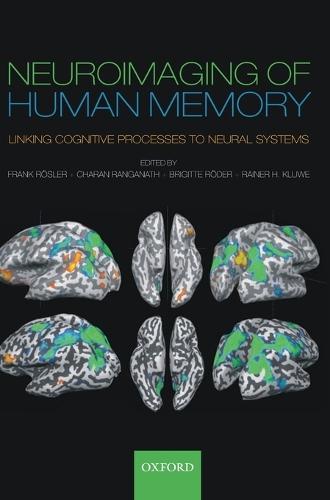Full Product Details
Author: Frank Rösler (, Professor for Experimental and Biological Psychology, Philipps University, Marburg, Germany) ,
Charan Ranganath (, Associate Professor, Center for Neuroscience and Department of Psychology, University of California at Davis, Davis, USA) ,
Brigitte Röder (, Professor for Biological Psychology and Neuropsychology, University of Hamburg, Germany) ,
Rainer Kluwe (, Professor for Psychology, Helmut Schmidt University, Hamburg, Germany)
Publisher: Oxford University Press
Imprint: Oxford University Press
Dimensions:
Width: 18.10cm
, Height: 2.70cm
, Length: 25.50cm
Weight: 1.121kg
ISBN: 9780199217298
ISBN 10: 0199217297
Pages: 488
Publication Date: 26 February 2009
Audience:
College/higher education
,
Professional and scholarly
,
Undergraduate
,
Postgraduate, Research & Scholarly
Format: Hardback
Publisher's Status: Active
Availability: Manufactured on demand

We will order this item for you from a manufactured on demand supplier.
Reviews
<br> This is a well written account of the intersection of cognitive psychology and functional neuroimaging that leaves little doubt doubt as to how far we have come in our understanding of human memory and the amazing potential yet to be realized when these approaches work together. To spend a few days paging through this book is an edifying experience. --Doody's<p><br>
<br> This is a well written account of the intersection of cognitive psychology and functional neuroimaging that leaves little doubt doubt as to how far we have come in our understanding of human memory and the amazing potential yet to be realized when these approaches work together. To spend a few days paging through this book is an edifying experience. --Doody's<br>
This is a well written account of the intersection of cognitive psychology and functional neuroimaging that leaves little doubt doubt as to how far we have come in our understanding of human memory and the amazing potential yet to be realized when these approaches work together. To spend a few days paging through this book is an edifying experience. --Doody's
Author Information
Frank Rösler received his Dr. phil in 1976 and the grade of a Dr. phil. habil. in 1982 both from Christian-Albrechts-University Kiel (Germany). He held academic positions at the Christian-Albrechts-University Kiel (1973-1986); the University of Hamburg (1983, 1985) and at Philipps-University Marburg (from1986 until the present). He spent short and long-term research visits in the US, in Australia and in the Netherlands. His research was awarded with the university prize of Christian-Albrechts University Kiel (1977), the Wilhelm-Wundt Medal of the German Psychological Society (DGPs, 2000) and the Max-Planck-Prize for international cooperation (2002). Frank Rösler is full member of Berlin-Brandenburg Academy of Sciences (BBAW) and of the German Academy of Sciences Leopoldina. His research interests focus on experimental psychology and cognitive neuroscience, in particular on studies of memory, executive functions, language, and neuronal plasticity employing EEG-ERP and fMRI measures. Brigitte Röder received her Dr. rer nat (equiv. to a Ph.D.) in 1996 from the Philipps-University of Marburg (Germany). As a postdoc she visited the Department of Psychology and Neuroscience (H.J. Neville), University of Oregon, Eugene (U.S.) from 1995 to 1997. Brigitte Röderwas the head of a junior research group from 1999 to 2003. Since 2003 Brigitte Röder has been a full professor for Biological Psychology and Neuropsychology at the University of Hamburg. For her scientific achievements she received awards of the German Society of Psychology, the Academy of Sciences (Goettingen) and European Society for Psychophysiology. Since 2007 Brigitte Röder has been a full member of the Academy of Science in Hamburg. Her main research interests are multisensory processing and neuroplasticity as a consequence of learning and sensory deprivation. Methods include behavioral and electrophysiological measures as well as functional magnetic resonance imaging (fMRI). Rainer H. Kluwe studied Psychology at the Universities of Erlangen and Trier; 1971 Diploma in Psychology; 1975 Dr. phil. University of Trier; 1981 Dr. phil. habil. Ludwig-Maximilian-University of Munich; Academic positions from 1972 until 1980 at the University of Kiel and the Ludwig-Maximilian University of Munich; since 1981 Professor of Psychology at the Helmut Schmidt University Hamburg; 1987 head of the Institute for Cognitive Research. 1978 - 1979 Research fellow Department of Psychology, Stanford University, CA., USA, funded by Foundation VW; Oct-Dec 1989 Visiting Professor Department of Experimental Psychology; Oxford University, UK and Visiting Fellow Wolfson College. Research interests: metacognition, working memory; 2002-2008 Priority program on executive control together with B. Hommel (Leiden) and I. Daum (Bochum) funded by the German Research Society.




